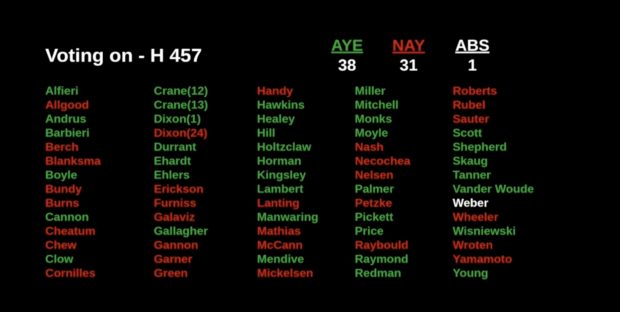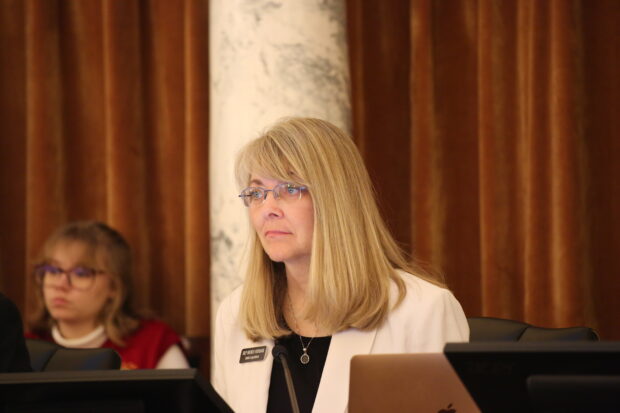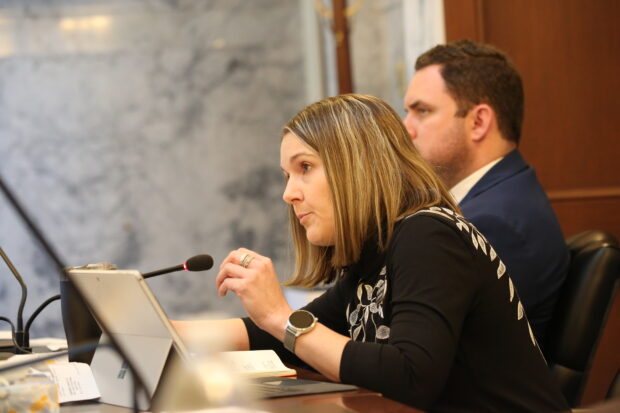After a revolt in committee — and hours of closed-door GOP caucuses — the Legislature’s budget battle finally reached the House floor on Wednesday morning.
The House did pass a budget bill, one funding the court system. However, the narrow 38-31 vote illustrated the sharp divides within the Republican caucus, bringing private fissures into public view.

The courts budget doesn’t directly affect education — but K-12 and higher ed budgets are on deck, and could come up in the House as early as Thursday. And in a spending season that is off to anything but a smooth start, a pair of big education programs sit squarely in legislative limbo. Idaho Launch and Empowering Parents — two of Gov. Brad Little’s pet education projects — could be left on the cutting room floor.
Many things are possible. Few things are clear.
But first and foremost, let’s recap Wednesday’s vote, a showdown weeks in the making.
The $88.5 million judicial budget falls under a new entry in the Statehouse lexicon. This “maintenance” budget is designed to give the court system what it received this year, with slight increases to cover items such as insurance. The plan is to come back later with another courts budget that would cover the rest — fully funding 3% pay raises and bankrolling any new line items.
The Joint Finance-Appropriations Committee approved 10 maintenance budgets on Jan. 16, allocating $5.1 billion on a series of party-line votes. Then, on Friday, JFAC rebelled. Rank-and-file Republicans did an about-face, banding with committee Democrats to pass a series of agency budgets that combined the “maintenance” money with the new line items. It was a startling rebuke against legislative leaders who have been pushing for a far-reaching overhaul of the way JFAC does its job.
Skepticism was woven into Wednesday’s testy floor debate. Opponents openly doubted that they would actually see a followup budget bill, suggesting that the Legislature could simply warm over last year’s budgets for schools and other state agencies and call it good. Others questioned whether a maintenance budget would meet the Legislature’s constitutional requirement to adequately fund the judicial branch.

“I’m not a lawyer,” said Rep. Wendy Horman, R-Idaho Falls, the House’s JFAC co-chair. “I’m not going to weigh in on whether this budget meets constitutional muster.”
However, Horman assured House members that JFAC is indeed scheduled to consider followup budgets for the courts in the coming weeks.
Much of the vocal opposition came from JFAC Republicans who actually voted for the bill in committee. Rep. Britt Raybould, R-Rexburg, said Idaho was taking a page from the congressional playbook, mashing several agency budgets into a confusing omnibus bill.
“That is not a process that I want to see adopted in the state of Idaho,” she said.

And most of the support came from conservatives who don’t sit on JFAC — and are clamoring for a clean opportunity to vote on budget line items, and possibly vote them down.
“This is almost zero-based budgeting, but not quite, and I hope we get there someday,” said Rep. Judy Boyle, R-Midvale.
The vote fell all over the map. Six of the House’s 10 JFAC members opposed the bill — including five of nine committee Republicans. The GOP leadership team voted to pass the budget, except for Majority Leader Megan Blanksma, R-Hammett. Every committee chair voted for the budget, save for House Education Committee Chairwoman Julie Yamamoto, R-Caldwell. This vote was no small challenge to leadership, particularly House Speaker Mike Moyle, and leadership prevailed.
Uncertainty hangs over the rest of the budgeting process.
If the House continues down the path of passing maintenance budgets — and the Senate comes along — the line items will have to navigate their way through JFAC and the House and the Senate, in separate bills later in the session. In theory, and possibly in practice, it could be easier to reject a line-item budget.
Such as Launch.
Gov. Brad Little’s ambitious but polarizing postsecondary incentives plan doesn’t appear in a maintenance budget. Not that Launch is a brand-new program. In 2023, a divided Legislature voted to create Launch, which would provide high school graduates with up to $8,000 to pursue college or job training. Since October, the state has received some 12,000 Launch applications, approving nearly 6,700 of them. But none of those first-time grants will go out the door unless the 2024 Legislature funds a Launch line item — and based on the votes from last legislative session, that’s no sure thing.
Meanwhile, Little’s Empowering Parents education microgrants program is also in trouble. Little’s budget team has suggested axing the $30 million program, which the governor himself hailed as a “resounding success” less than two months ago. It all comes down to the revenue projection JFAC winds up using as a basis for the budgets — and “there is not consensus behind a number,” Horman said during debate Wednesday. If JFAC adopts a low estimate, Little might serve up Empowering Parents as a sacrifice program.
So that’s why, and how, Little could come away from the session with neither Launch nor Empowering Parents.
Lawmakers often say — usually during the final tempestuous days of a session — that they really have only one job. They have to pass budgets before they can adjourn.
This year, budgeting is shaping up to be a tougher job than usual.
Kevin Richert writes a weekly analysis on education policy and education politics. Look for his stories each Thursday. Due to the timeliness of the topic, this week’s analysis was published on Wednesday, Feb. 7.
